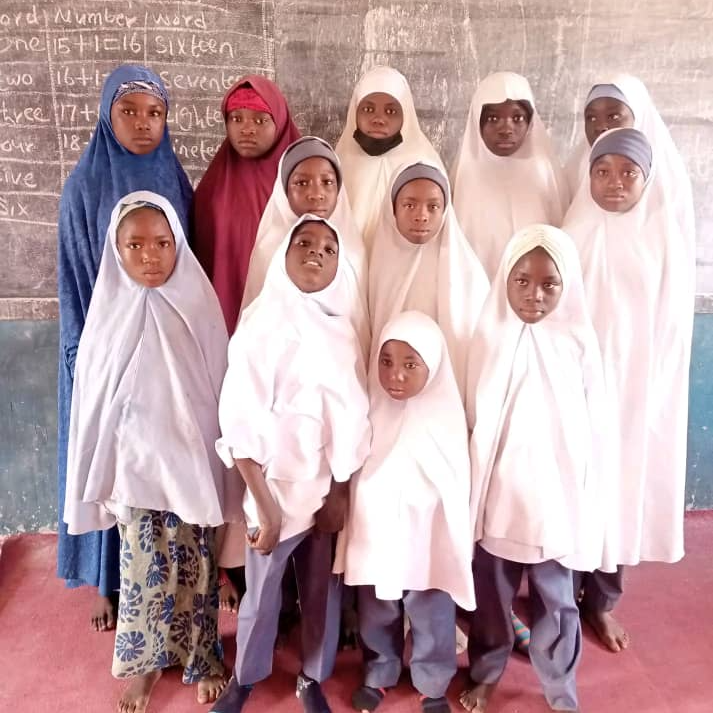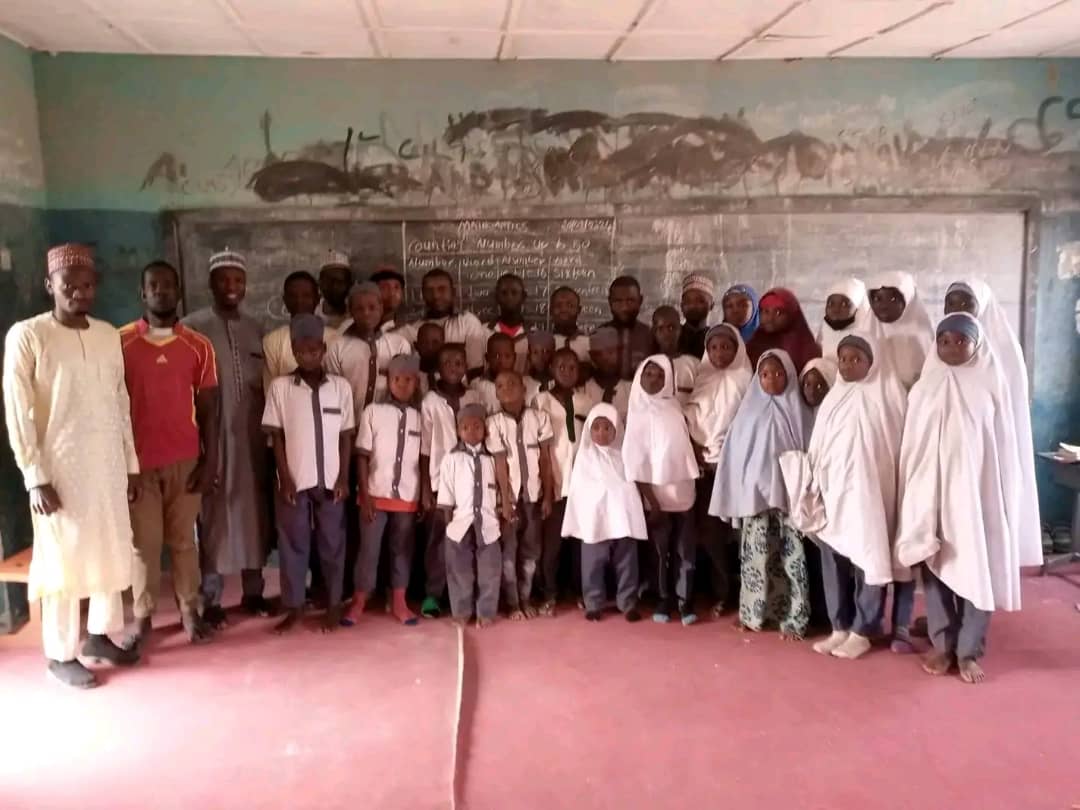Ibrahim Tukur recalled his boyhood days in Galadimawa community in the Nigerian state of Katsina. Gesturing wildly, he described the taunting voices of the young and the elderly in his neighbourhood, who called him “kurma,” a derogatory word in Hausa used to refer to someone with hearing loss. Each time Tukur’s peers called him “kurma,” he chased after them for a fight. As the stigma worsened in time, Tukur’s parents were forced to relocate to Sabon Gari, another community within the town of Ingawa. The year was 2008.
At the age of 6, Tukur was diagnosed with meningitis, an acute inflammation that affects the membrane surrounding the brain and the spinal cord. He lost his hearing to this infection; as a result, many of his childhood friends kept their distance from him. Although heartbroken by their son’s illness, his parents remained a pillar of support, visiting doctor after doctor and trying out many different medications. No improvement yet. In the end, as Tukur recounted, his family resorted to God as their last hope.
Tukur is among an estimated 9.5 million Nigerians living with loss of hearing, according to the United Nations. The crushing loneliness and the sting of stigma that blighted his childhood have, however, spurred Tukur to take on disability rights.
The Genesis
Tukur’s first school was Dambo Tukur Model Primary School. When he couldn’t even write his name because of his sudden loss of hearing, Tukur’s parents transferred him to a special government-run school far from their home. The new environment helped Tukur master reading and writing. He bagged a degree in special education and sociology in 2023.
Although he faced no discrimination on campus, the 28-year-old admitted grappling with class lectures, which were hard to follow without a sign-language interpreter. More often than not, he just stared at the lecturer, wishing he could follow the lecture like his colleagues. Soon he found a way around this: sitting closer to his classmates during dictation so he could copy from their notes. Outside of the classroom, Tukur frequented the university library, where he buried himself in literature on his field of study.
An idea began to form in his mind. Between May and December 2020, he launched an entrepreneurship program for people with hearing impairments in Ingawa, his hometown. The program equipped over 50 individuals with the skills to launch their own businesses. Around the same time, he also spearheaded training in sign language to significantly enhance communication between hearing people and the hearing-impaired.
During his stint as Youth Leader of the Katsina State Association of the Deaf, Tukur collaborated with various organisations to allow individuals with hearing loss access to equal opportunities. “My efforts have been focused on advocating for a more inclusive society where persons with disabilities will have equal opportunities to participate in all aspects of life, including education, empowerment, employment, and healthcare,” Tukur said. This, he added, was in addition to serving as a mentor for some youths with hearing difficulties.
Local action
Tukur lamented about the insensitivity of government projects to the concerns of people with disabilities. This was visibly manifest in the unequal job opportunities and empowerment programs facilitated by lawmakers. In June 2020, Tukur pooled a team of people with disabilities to discuss strategies for achieving equal access to opportunities.
“We agreed to meet all leaders and express our dismay, starting with the House of Rep,” Tukur said. Their effort to see the lawmaker fell through, however, he said. Resolute in their campaign, the team came up with another plan. “We met his close friend, who happened to be the uncle of one of us, and requested his help to get us an audience with the Honourable.”
During their meeting, they explained their problems to the lawmaker and stressed the need for people with disabilities to be included in everything. Having listened to their concerns, the lawmaker promised to support their idea. 2 weeks later, 3 of them received sewing and grinding machines, with several others receiving permanent job offers months later.
Seeing the success of their resolve, Tukur and his team broadened their cause into a robust program named the Disability Inclusion Advocacy Program. It is a subsidiary of the KIK Deaf Mobilization Forum, a political group that mobilizes support for politicians who care about the rights of persons with disabilities across Kankia, Ingawa, and Kusada local government areas.
Equity in education
Tukur and his team pushed their advocacy to the Ingawa local government secretariat, pushing for the establishment of a special school for Ingawa children with hearing impairments. There were few such schools in Katsina State; one such school in Daura is at least 55 kilometers from Ingawa.
The campaign was no mean feat, Tukur admitted. Local officials didn’t seem attuned to the challenges experienced by people with disabilities. With sheer persistence, Tukur and his team recorded another success. In October 2023, the Dambo Tukur School for the Deaf was launched in Ingawa.
Yet some parents hesitated to enrol their children. “Some of them don’t understand how important education is for their deaf children. So we had to go from one house to another, explaining how school could change their children’s lives and encouraging them to enrol,” Tukur stated.
At least 43 students—boys and girls—from both Ingawa and Kusada local government areas—have been enrolled in the school despite having only 1 classroom.
Tukur leads the team as headteacher, working alongside two hearing-impaired teachers and another with special education training at the NCE level. The school’s curriculum covers basic subjects such as English language and math, including Islamic studies, sign language, among others.
Notable progress
From the university graduate who overcame hearing challenges to become an educator to the journalist using sign language to empower others who experience hearing loss, Tukur’s advocacy exemplifies the graceful achievements of people living with disabilities, amid myriad limitations.
The new school in Ingawa is completely free for pupils. Right now, the local government runs it, but there are plans for the Katsina state government to take over.
Tukur noted that teaching children with hearing-impairment can be challenging, but they have seen a lot of progress. The pupils are taught moral ethics such as praying regularly and treating elders with respect. This, according to Tukur, is a big change from the past.
“It’s not an easy task because teaching deaf children requires a special teaching methodology. However, the past few months have been very interesting. We always started by asking them questions about the lesson to get their minds thinking,” Tukur told Prime Progress. He further added that communication challenges are common for children with hearing impairments, but their efforts are yielding progress.

Some of the students Prime Progress connected with shared their excitement about learning at the school. Shafi’u, Auwalu, and Ramatu stated that the school is a turning point for them. They’re optimistic about a promising future.
But there’s still room for improvement …
Tukur hopes to expand Dambo Tukur School for the Deaf into a boarding school to offer access to children from at least 7 nearby local government areas.
There are still hurdles to overcome, Tukur admitted. Despite the school’s free tuition, some parents won’t enrol their children because they believe education won’t benefit their children. But, as in his earlier campaigns where he’s faced resistance, Tukur is hopeful that he will change this perception and make education accessible for many more hearing-impaired children in Katsina.
Ibrahim Tukur, who lost his hearing to meningitis at age 6, grew up facing stigma in Galadimawa, Nigeria. Despite his challenges, he completed his education, earning a degree in special education and sociology in 2023. Tukur’s experiences motivated him to advocate for disability rights, particularly focusing on education and employment opportunities for people with hearing impairments.
He initiated an entrepreneurship program in 2020 for hearing-impaired individuals in his hometown, and later the Disability Inclusion Advocacy Program, which collaborates with lawmakers for equitable opportunities. Tukur also successfully campaigned for a special school for the hearing-impaired in Ingawa, which opened in October 2023 and is now free for pupils, with plans for state government management.
The school, which Tukur heads, currently enrolls 43 children and focuses on a curriculum that includes basic subjects and moral education. While there are challenges, including parental reluctance to enroll their children, Tukur remains hopeful and is working toward expanding the school to serve more communities.






